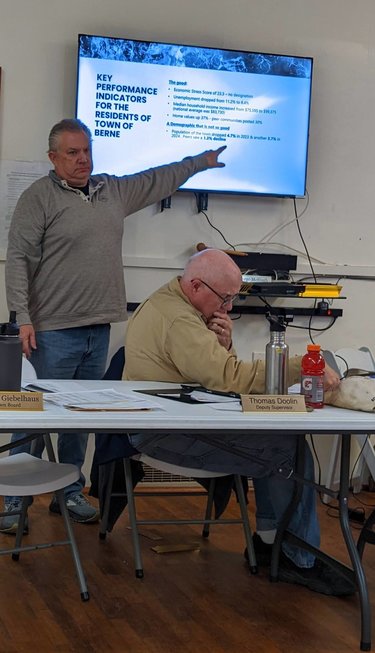Giebelhaus ‘rights the ship,’ increasing taxes by 38%
BERNE — Councilman Joseph Giebelhaus has released a $4.24 million preliminary Berne town budget for next year that, he says, “rights the ship by aligning revenues with actual costs,” increasing town taxes by 38 percent.
The proposed tax rate per $1,000 of assessed valuation would go from $4.70 to $6.48.
The increase, Giebelhaus says, is to eliminate an average deficit spending of 30 percent from 2021 to 2023.
The preliminary budget has been filed with the town clerk and a hearing on it will be held on Nov. 12 at 6 p.m.
Typically, a supervisor, as the town’s chief financial officer, releases the budget but Berne’s supervisor, Dennis Palow, ceded that responsibility to Giebelhaus.
“This came from Joe Giebelhaus,” said Palow of a budget and financial presentation during an Oct. 22 public hearing as the town board considered a law that would allow Berne to go over the state-set levy limit. “He did it on his own,” said Palow.
All four board members voted in favor of piercing the tax cap.
Palow, a Republican, was elected supervisor in 2021, having served as deputy supervisor previously under Republican Sean Lyons. In the 2021 election, Republicans carried forward the revolution they staged in the majority-Democrat town when they took over the town board in 2020, after making inroads two years earlier when they elected Lyons as supervisor and Palow as councilman.
In August 2024, three of those GOP-backed councilmen resigned at once, claiming Palow fostered a toxic work environment as well as citing fiscal mismanagement.
This led to a seven-month hiatus for town government until the governor appointed Melanie laCour, a Democrat, as councilwoman, restoring a quorum on the five-member board.
In April, the three council members appointed Giebelhaus, a Democrat, to the board. Giebelhaus is now running unopposed for supervisor, having secured the Democratic, Republican, and Conservative lines.
Big picture
At the Oct. 22 hearing, Giebelhaus gave an overview of Berne’s financial status, largely based on figures from the state comptroller’s office. “Up to 2023, it was scary …,” he said. “I’m not saying we’re out of the woods yet.”
The comptroller rates fiscal stress for a municipality on a scale of 0 to 100 with zero meaning no stress. Giebelhaus noted that, in 2024, the town scored 13.3 points, dropping from 26.6 points in 2023.
He also noted that the town’s assigned unappropriated and unassigned fund balance, which had dropped to under $55,000 in 2023 was up to nearly $400,000 in 2024.
Giebelhaus also reported that, from 2023 to 2024, population in Berne has decreased 3.4 percent, after a drop of 4.7 percent the year before, while similar towns saw a decline of 1.3 percent.
He explained that means the town will be receiving less in sales-tax funds from the county, since distribution is based on population. Berne, like other towns in Albany County, depends on sales-tax revenues for a significant portion of its budget.
At the same time, from 2023 to 2024, the unemployment rate in Berne decreased from 11.2 percent to 8.8 percent; median household income increased from about $76,000 to about $99,000 while fewer households received public assistance: 8.42 percent to 7.82 percent.
Giebelhaus concluded that Berne has “a mixed financial outlook, with improvements in certain areas but potential challenges ahead.”
Among his recommendations was expanding cash reserves. He noted that peer communities maintain over 900 percent of annual expenses while Berne maintains a monthly average of 51 percent.
“This should be a major concern for us,” he said.
Berne’s fund balance, to be on a par with peers, should be close to $3.2 million, he said.
Peer communities spend 37.5 percent of their revenue on personnel while Berne spends 64 percent, Giebelhaus said. The town has 51 paid posts.
He also said the tax levy over time has not been reflective of cost increases and needs adjustment.
Giebelhaus also said that 1.5 percent of the town’s revenue goes to debt service compared to about 4 percent for peer municipalities and suggested that borrowing would improve the town’s cash flow.
Giebelhous recommended coming up with a strategic plan to develop a capital improvement program and to establish policies on maintaining a minimum fund balance and reserve funds.
His presentation was met with applause from the score of people who attended the hearing.
Public hearing
“Kudos for moving in the direction we’re going in,” said Lynn Kerr, one of a handful of residents to address the board before its vote to pierce the tax cap.
She went on to say, “My main, main concern is that we have so many people on a fixed income … we have a large senior population.”
Based on 2020 federal census data, 20 percent of Berne residents are 65 or older and the median age in Berne is 50.
“We can’t look at everyone’s income,” responded Palow.
“Social Security has not kept up with inflation,” said Kerr.
“Nor has the tax bill,” responded Senior Account Clerk Andrea Borst. She later said of seniors, “I feel for them,” adding that “it’s tough” for the board.
Kerr also asked, with a tax-cap override, “Is there a cap to the override?”
“No,” responded Borst, adding, “That’s unfortunate.”
Palow interjected, “Where was everybody when they got a tax break?”
Berne had been relying on a fund balance built up by former Democratic supervisors Kevin Crosier and Alan Zuk to cover the gap created when Lyons and his board voted to lower taxes around 87 percent for 2022, after making single-digit (though still substantial) decreases almost every year since he took office in 2016.
Then, in 2023, with the fund balance depleted and town bills going unpaid, taxes were increased by over 750 percent.
So in 2024, a Berne resident with a home assessed at $300,000 would have paid $1,380, instead of the $162 they paid in 2023 under the rate of 54 cents per $1,000 of assessed valuation.
“That was a bad idea,” Kerr said of the tax breaks to which Palow countered, “Two bags of groceries … costs over 200 bucks.”
Responding to Kerr’s question on no limit to the override, Councilwoman laCour said, “You have to put your faith in elected officials.” She urged residents to vote for people they trust and said, “We can’t look backwards.”
LaCour advised focusing on what needs to be done to fix financial problems.
“It is going to be painful for a little while … and then hopefully, it will be more smooth sailing,” she said.
“I’ve been seeing … death by 1,000 cuts trying to do things incrementally …,” said Giebelhaus. “Let’s look globally, long-term not short-term.”
He also said that “spikes in purchasing have been hidden” since the town was drawing from its fund balance to pay bills.
“I’m a new resident as well … I want stabilization,” said Giebelhaus.
Dennis Barber, a Berne resident who formerly lived in Knox and served on the town board there, said, “I see a spending problem.”
He noted that Knox, unlike Berne, does not pay its planning board and zoning board members for their work.
“Move back to Knox if you’re not happy,” responded Palow.
Preliminary budget
Giebelhaus presented his budget in an Oct. 30 release as a spending plan that “ends years of deficit spending and restores fiscal stability”
Expenditures total $4.24 million across the general, highway, and sewer funds.
Revenues come from a $1.39 million property tax levy, $57,400 from reserves, and $2.79 million in non-tax revenues largely from sales tax distributed by the county.
“This budget confronts the hard truth: past tax policies and reliance on reserves masked chronic underfunding,” Giebelhaus said in the release.
The 37.87-percent increase in the levy is primarily to eliminate the 30-percent average deficit spending from 2021 to 2023, he said, adding, “Even with inflation, the new rate more accurately reflects the true cost of town operations.”
Responding to questions raised at the public hearing, Giebelhaus said this week that the compensation for appointees to the zoning and planning board in Berne totals $25,299 in the preliminary budget, which he said is in line with 20 to 30 percent of towns in New York state that pay appointed board members.
He also said that personnel costs in the preliminary budget are 43 percent of Berne’s total expenses due to an increased focus in the budget on capital needs. Giebelhaus said that 43 percent is below the typical 50 to 65 percent for similar towns.
He highlighted these expenditures:
— $1.76 million in the General Fund with 34 percent for government operations and 21 percent for public safety — including $140,706 for Advanced Life Support ambulance service supplied by the county sheriff’s office. Berne has the only remaining Hilltown volunteer squad, Helderberg Ambulance, which supplies Basic Life Support;
— $2.37 million for the Highway Fund with 55 percent dedicated to infrastructure. This includes $600,000 for two replacement trucks and $627,000 in road and bridge repairs funded by the state’s Consolidated Local Street and Highway Improvement Program, known as CHIPs, and other state programs.
Giebelhaus notes that the two trucks are from 2007 and the comptroller recommended they should have been planned for in 2015; and
— $100,511 for the Sewer Fund, which is self-sustaining since the costs are covered by user fees.
Giebelhaus also points out the town’s transfer station as a problem, “operating at such a huge loss.”
Tipping fees charged by the Albany City Landfill on Rapp Road to Berne have gone up and the landfill is also expected to close within a matter of years.
Giebelhaus said he plans to set up a committee, including citizens, “to guide the town in the next steps in how to address the issue.”
The preliminary budget sets these yearly salaries for elected town officers:
— Supervisor: $25,000;
— Town board members: $3971.75 each for four members;
— Town clerk: $52,498;
— Highway superintendent: $67,465;
— Town justices: $10,589 each for two justices; and
— Tax collector: $7,504.
At a budget workshop on Oct. 22, the highway superintendent, Randy Bashwinger, said he would forego his raise so that the two diesel mechanics could get raises.
Giebelhaus also said he would forego his raise, stating in his budget announcement, “Although appreciated, the town is still under financial stress and now is not the time for leadership to accept a raise.”


